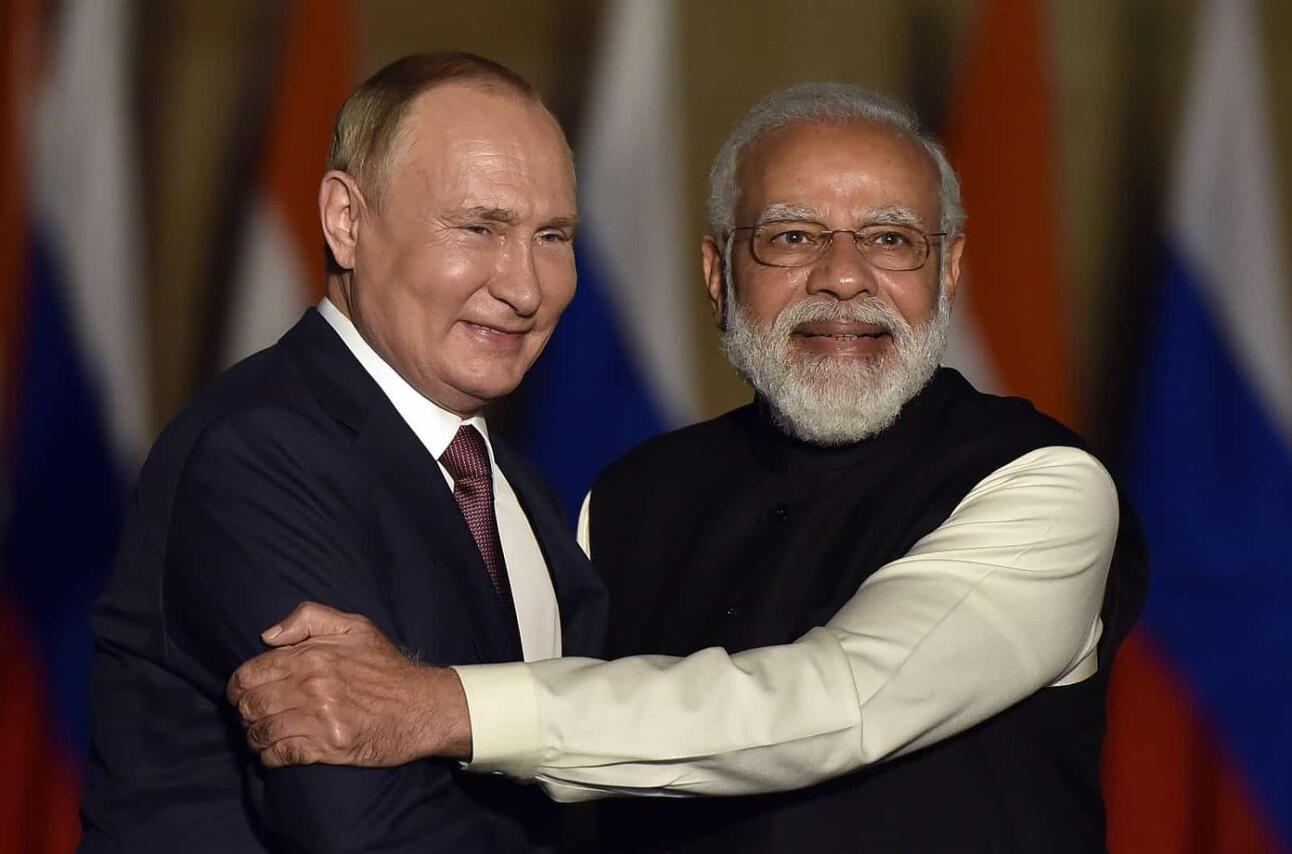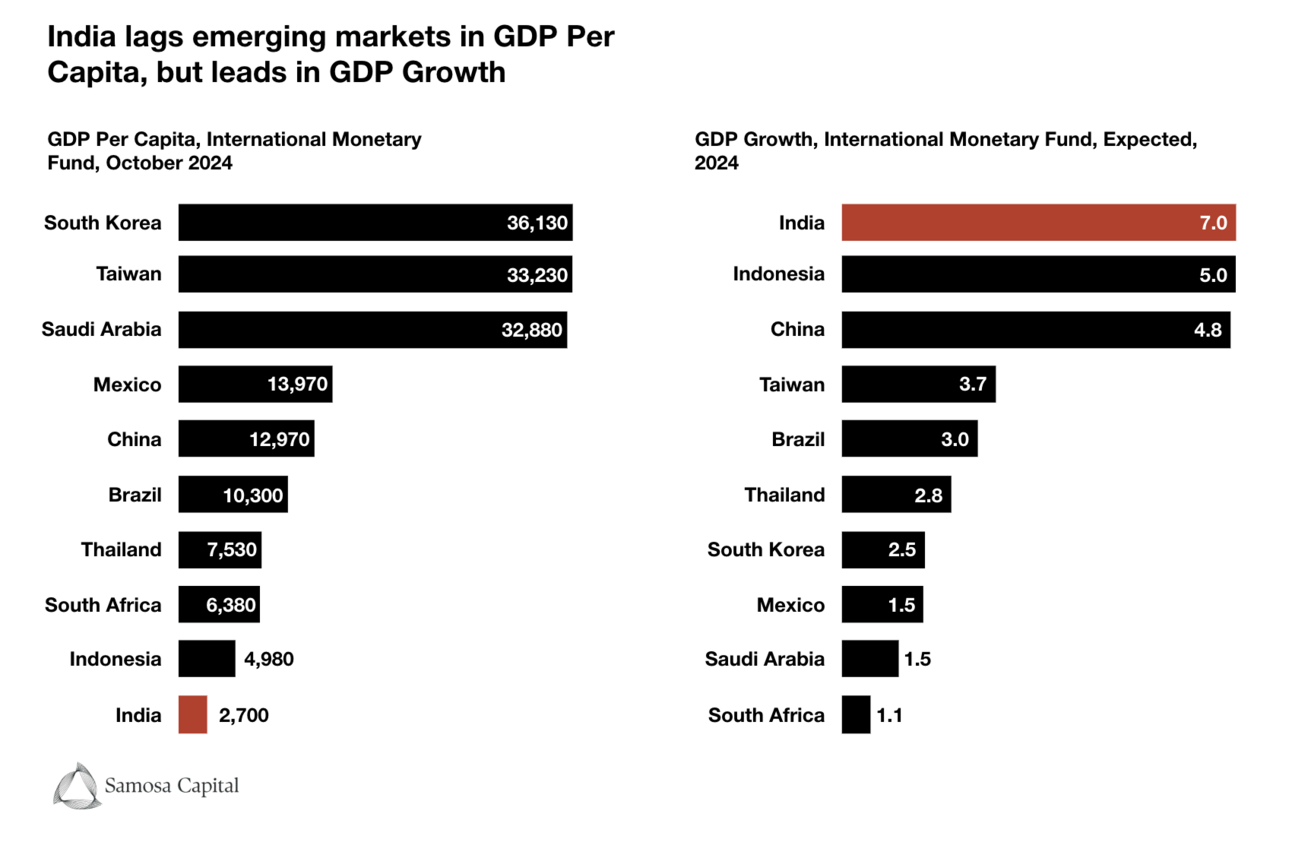
Welcome to Samosa Capital’s evening briefing — the best way to stay up-to-date on India’s financial markets. Here’s what’s in today’s newsletter:
Apple will start producing AirPods in India,
India unveils a big trade deal with Russia,
And, the UK and India are inching closer.
Finally, we’ll close with Gupshup, a round-up of the most important headlines.
If you have feedback on our newsletter or just want to chat about India, always feel free to reach out to me. You can also share criticism about the newsletter anonymously here.
—Shreyas, [email protected]
Market Update

Live Event
Seats are running out for our upcoming “Future of India” expert panel and networking event on Wednesday, February 12, 2025, in New York City. Buy now here, or earn a free ticket by sharing Samosa Capital with three friends.
AirPods, Now Made in India

Apple will start producing AirPods near Hyderabad early next year, marking a second milestone for diversification, Bloomberg reported Sunday. This shows a larger shift in Apple’s strategy to diversify supply chains from China. India will now produce $14 billion (₹1.2 trillion).
Who cares? Exports of Indian-made iPhones jumped by 33 percent from the start of 2024 to September resulting in an annual sales volume of $8 billion YTD (₹677.6 billion). Apple is looking to break into the Indian market since it currently only has a 3.5 percent market share of the over 700 million phones in use while India is looking to lure further tech investment.
India Doubles Down on Russia

India's Reliance and Russia's Rosneft have signed a $13 billion-per-year (₹1.1 trillion), 10-year deal for the supply of 500,000 barrels of crude daily, marking the largest-ever energy agreement between the two countries, with India benefiting from discounted Russian oil amid Western sanctions, as per Reuters this weekend.
Why: Minister Jaishankar supports this plan for its de-risking benefits, as Indian policymakers have faced challenges from U.S. sanctions disrupting trade with nations like Venezuela and Iran. To bypass such restrictions, India has been executing oil deals with Russia using a mix of dirhams, dollars, yuan, and rupees, instead of relying solely on dollars like most oil exporters.
Chart of the Day

UK and India’s Economies Inch Closer

New data from HSBC, the only British bank with a significant presence in both nations, shows 36 percent more business client referrals in the UK originating from India than in 2023 plus bilateral payments rose as well (121 percent India to UK; 36 percent UK to India). The update puts increased pressure on British and Indian diplomats to close ongoing trade negotiations.
In November, Prime Minister Keir Starmer announced the re-opening of a potential United Kingdom and India free trade deal, which would open the gates of free capital from British investors into Indian markets, and vice versa. Given the openness of British capital markets, London could become the best entry for global investors to easily access Mumbai.
What took so long: India has among the highest tariff rates of major economies, at an average of 5.87 percent weighted by goods. This has introduced numerous complexities into the deal, especially as the UK sorts its own trade policies post-Brexit. Former PM Boris Johnson had hoped to hammer out trade talks by Diwali 2022 but political volatility in both countries has led to delays which PM Keir Starmer hopes to end in 1Q25. The UK seeks to become a high-profile investment capital for Indian money while India can develop a growing positive trade balance.
Current trade totals are $53 billion (₹4.5 trillion) with 60 percent of that being exports from India to the UK.
Gupshup
Macro
India’s economy surged at year-end 2024 as the Composite PMI hit a four-month high of 60.7, driven by strong demand in services and manufacturing. This growth highlights sustained private sector expansion and improved momentum heading into 2025.
India's wholesale inflation eased to 1.89 percent year-on-year in November, down from 2.36 percent in October, as food price increases slowed to 8.92 percent, retail inflation dropped to 5.48 percent, and manufactured product prices rose 2 percent, boosting expectations of a central bank rate cut in February.
India's merchandise trade deficit soared to a record $37.84 billion in November, driven by a 27 percent surge in imports, including a record $14.8 billion in gold, while exports fell 4.9 percent year-on-year, exacerbating current account pressures and pushing the rupee to a record low.
Expect higher than normal bond issuance next year due to pandemic-era issuance since those credit instruments were short-dated. ICICI sees record highs in terms of Indian issuance which would lead to fixed-income underperformance and a slight rise in rates.
Loan books have grown due to more house buyers across states due to retail earnings rising. In 2013-14, retail loans only made up 18 percent of the average loan book compared to 34 percent today.
Rice reserves in India are now 5 times the government target, boosting export talk. Rice reserves are at 44.1 million metric tons compared to the 7.6 target. Last year’s weaker harvests led to total export bans which have slowly rolled off this year. An added benefit is the possibility of seeing weaker food inflation in upcoming readings.
Equities
Reliance performs worse than the market due to debt and cash flow concerns. Although there are growth prospects for the company in the broadband space, increasing debt load and stagnant earnings have led to a 15.5 percent differential in performance between it and the NIfty50.
UBS sees risk to India if US-China trade talks continue to weaken. UBS’s chief strategist Bhanu Baweja sees deteriorating trade talks as a further risk to the rupee and firm profits. China, in the event of tariffs, would sell cheap goods elsewhere globally resulting in equities struggling.
Alts
Tata Starbucks, operating over 450 outlets, plans to adjust its store openings due to slowing customer traffic amid high inflation, scaling back from 100 to 80 new stores this year while still targeting 1,000 locations by 2028.
Both Adani and Ambani struggle due to a lack of investor confidence. Investors are currently balking at Reliance’s short-term financing needs and Adani Group’s ability to continue securing infrastructure deals. In the same time frame, broader Indian assets have also fallen in value.
Creditors, including India, are close to releasing Sri Lanka from default in a $12.6 billion (₹1.1 trillion) bond that they failed to pay coupons on. 98 percent of creditors are in agreement to take on new securities that will mature later with lower interest rates. Sri Lanka worked with independent owners, the IMF, and various nations such as Japan, China, and India.
Carlyle aims for a $1 billion (₹84.7 billion) IPO of Quest Global. Quest Global provides engineering services in aerospace, automotive, health care, semiconductors, and energy globally. The deal would value the company at $5 billion (Rs. 423.5 billion) and require the Singapore-based firm to re-domicile in India.
Policy
Key evidence, including payment ledgers and emails, bolsters the U.S. fraud case against Indian billionaire Gautam Adani, who is accused of bribery and securities fraud. However, extradition to the U.S. is considered unlikely as Adani denies the charges and remains active in India.
India plans to supply LNG to Sri Lanka for five years, connect power grids, lay a petroleum pipeline, and jointly develop offshore wind projects, including a $442 million investment by Adani Green Energy, Prime Minister Modi announced during Sri Lankan President Dissanayake's visit.
Modi's $6 billion (Rs. 508.2 billion) bid to build submarine stalls. The government is adding naval capacity to combat China’s growing regional incursions. The stall is due to the military seeing if all proper procedures were followed under the new military plan – one where foreign players partner with local Indian firms to deliver machinery.
Banks will likely miss SEBI's New Year deadline for cybersecurity frameworks. SEBI wants more frequent audits, robust disaster recovery plans, and data storage within India. Banks are requesting more time, but non-compliance by January 1st could result in fines.
See you Wednesday.
Written by Yash Tibrewal. Edited by Shreyas Sinha.
Disclaimer: This is not financial advice or recommendation for any investment. The Content is for informational purposes only, you should not construe any such information or other material as legal, tax, investment, financial, or other advice.